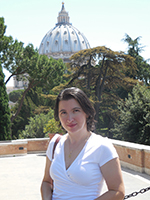 Mirela Oliva is Associate Professor of Philosophy at University of St. Thomas, Houston. We invited her to answer the question “What does philosophy of religion offer to the modern university?” as part of our “Philosophers of Religion on Philosophy of Religion” series.
Mirela Oliva is Associate Professor of Philosophy at University of St. Thomas, Houston. We invited her to answer the question “What does philosophy of religion offer to the modern university?” as part of our “Philosophers of Religion on Philosophy of Religion” series.
The modern university is supposed to be a space that facilitates professional training and personal growth. Asking questions about the meaning of life might sound bombastic by the current academic standards, but it nevertheless touches everybody’s mind and heart. Why am I born? Why do I have to die? How can I make my life meaningful? Is there any narrative structure of my life? Such questions range from metaphysical to ethical and aesthetic aspects of human existence. Philosophy of Religion is well equipped to deal with them precisely because philosophy is, in itself, a discipline structured along these lines. Philosophy can uncover these aspects in religious texts and practices and bring them into deep discussion in a classroom. In fact, philosophy and religion address the meaning of life, and each of them in a peculiar way: the former deploys critical reasoning, the latter relies on apologetic affirmation (sometimes narrative), revelation, and rituals. From the cooperation of philosophy and religion emerges a rich treatment of these issues. Academically, this exchange can take place in several departments (Philosophy, Theology, Religious Studies, Cultural Studies) and programs focused on the Humanities and Social Studies (Liberal Studies, Anthropology).
The success of such endeavor depends, I believe, on the right ethos. To be sure, Philosophy of Religion in a modern university must be inquisitive, critical and rigorous like every other academic discipline. Unlike Theology that defends the beliefs of a certain religion, Philosophy of Religion must be able to open an inter-religious conversation. 1) It is required to question the assumptions and consequences of religious beliefs for a person’s life. 2) It must set up an analysis of symbols and rituals that support those beliefs, relentlessly searching for truth and meaning. 3) It must stand in the middle between theological apology and cultural dissection. 4) Without any prejudice, it must keep a vivid interest in the true knowledge of life and reality.
At the same time, if we really want Philosophy of Religion to make a difference in the modern university, we have to convey passion, enthusiasm and persuasive strength in the classroom. The discussion of the meaning of life cannot be therapeutic, for it cannot directly and openly address the personal situation of each student. But it should be nonetheless inspirational and motivational. Philosophy is quite fortunate to inherit one of the oldest and most appreciated teaching methods, the Socratic method. In conjunction with the intensity, the urgency and the beauty of religious texts, symbols and rituals, such method can prove prolific and uplifting. One cannot talk about the meaning of life without letting oneself be carried, at times, by the high notes of this search: gravity, paradoxical tension, joy of discovery, humor.
We have, therefore, to define our discipline not only in terms of object and method, but also in terms of disposition and style. Philosophy of Religion is called to talk about the meaning of life in a way that helps students to grow as human beings. This is why, I believe, our discipline will be increasingly significant in the modern university.
